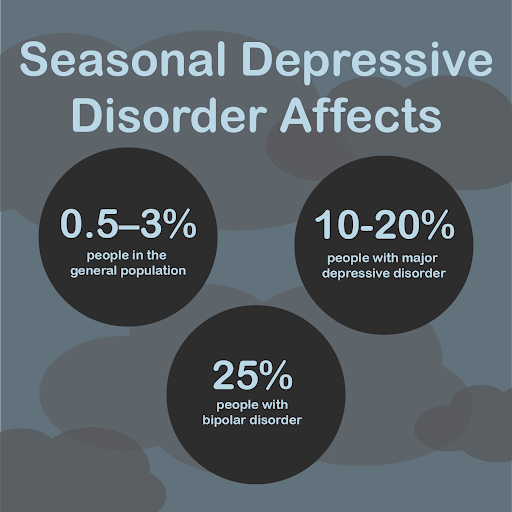With the changing of seasons and turning of leaves comes a condition many people know too well: seasonal affective disorder, or seasonal depression. Seasonal affective disorder (SAD) affects 0.5 to 3 percent of individuals in the general population: 10 to 20 percent of people with major depressive disorder and about 25 percent of people with bipolar disorder (Mental Health America).
We’re not entirely sure why people are so negatively affected by the shift to winter months, but some experts think that the shift has something to do with the disruption of the body’s circadian rhythms, which regulate how we function during sleeping and waking hours.
As someone who has felt the effects of this condition every year when the skies cloud over, I have some tried and true tricks for keeping the worst of it at bay.
My roommate and I have started taking Vitamin D pills every fall. We get a good percentage of our exposure to this vitamin through sunlight, so when that factor goes away, we can experience withdrawal symptoms such as fatigue and depression. Once you start taking those vitamins and reintegrating the “sunshine” into your life again, it can help alleviate some of the seasonal symptoms.
It’s also important during this time to prioritize leaving your room and spending time with others. Engaging in social activity outside of your own space will ensure that you’re spending your time doing enjoyable things, which will in turn boost your mood. The less social you are, the more prone you will be to isolating yourself, which will make your seasonal depression worse.
There are so many fun in-person activities you can do during this time of the year, like going to pumpkin patches or ice skating when winter rolls around.
As much as you might not want to, getting up and exercising is going to help with SAD and other forms of depression as well. Every time you exercise, you’re releasing a host of good chemicals into your brain and body, like endorphins and dopamine, that will help raise your mood.
Finally, don’t forget to take care of yourself and prioritize self-care. These months are hard for everyone, and engaging in activities that make you happy and put yourself first will make all the difference. — Ella Cutter


Leave a Reply